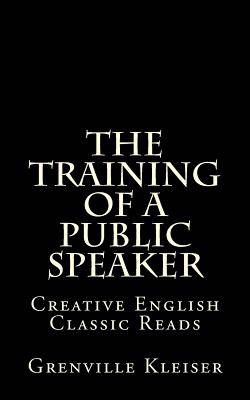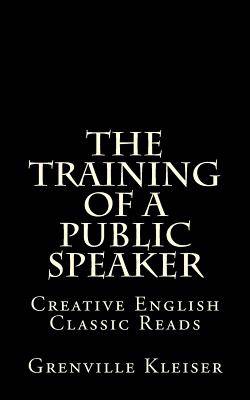
- Afhalen na 1 uur in een winkel met voorraad
- Gratis thuislevering in België vanaf € 30
- Ruim aanbod met 7 miljoen producten
- Afhalen na 1 uur in een winkel met voorraad
- Gratis thuislevering in België vanaf € 30
- Ruim aanbod met 7 miljoen producten
Zoeken
The Training of a Public Speaker
Creative English Classic Reads
Grenville Kleiser
Paperback | Engels
€ 17,45
+ 34 punten
Omschrijving
The aims and purposes of speaking to-day have radically changed from former times. Deliberative bodies, composed of busy men, meet now to discuss and dispose of grave and weighty business. There is little necessity nor scope for eloquence. Time is too valuable to permit of prolonged speaking. Men are tacitly expected to "get to the point," and to be reasonably brief in what they have to say. Under these circumstances certain extravagant types of old-time oratory would be ineffectual to-day. The stentorian and dramatic tones, with hand inserted in the breast of the coat, with exaggerated facial expression, and studied posture, would make a speaker to-day an object of ridicule. This applies equally to speech in the law court, pulpit, on the lecture platform, and in other departments of public address. The implicit demand everywhere is that the speaker should say what he has to say naturally, simply, and concisely.
Specificaties
Betrokkenen
- Auteur(s):
- Uitgeverij:
Inhoud
- Aantal bladzijden:
- 150
- Taal:
- Engels
Eigenschappen
- Productcode (EAN):
- 9781490992853
- Verschijningsdatum:
- 15/07/2013
- Uitvoering:
- Paperback
- Formaat:
- Trade paperback (VS)
- Afmetingen:
- 127 mm x 203 mm
- Gewicht:
- 154 g

Alleen bij Standaard Boekhandel
+ 34 punten op je klantenkaart van Standaard Boekhandel
Beoordelingen
We publiceren alleen reviews die voldoen aan de voorwaarden voor reviews. Bekijk onze voorwaarden voor reviews.








